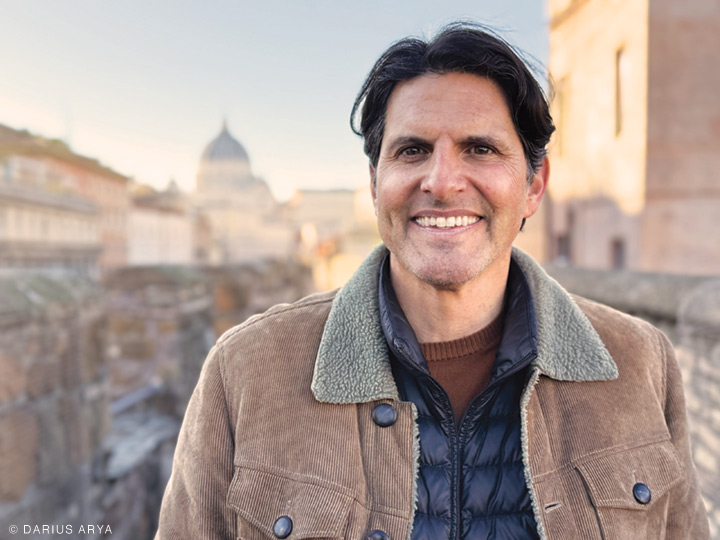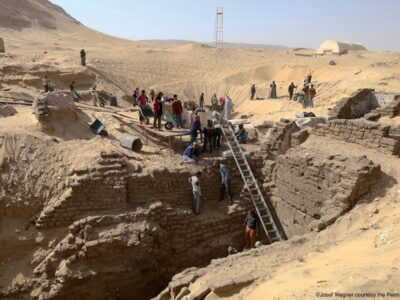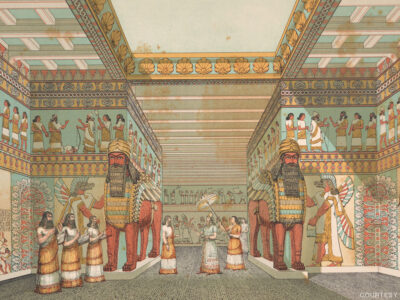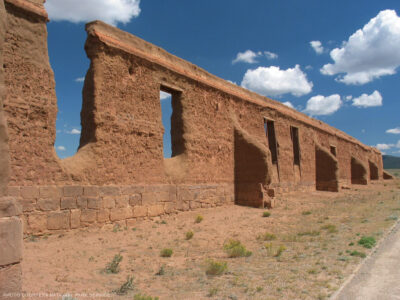
This media-savvy archaeologist thinks about the Roman Empire a lot—and is ensuring that others do as well.
Long before TikTok made it a thing (circa mid-2023) for women to ask the men in their lives how often they think about the Roman Empire, Darius Arya C’93 knew that social media could be harnessed to tap into such a fascination.
“It’s because of Vesuvius and the preserved city of Pompeii, it’s because the Romans left so much stuff around the whole world, it’s because we have all the literature and texts,” says Arya, a Rome-based archaeologist and educator. “If you look at any other ancient society, there’s nothing that comes close to the graffiti on the wall, the humor, the sports heroes. It’s all so compelling that I realized that it was a great learning opportunity. But I also saw that people were consuming information differently. They wanted it instantly.”
Whether offering his own simple iPhone footage or taking advantage of the high-tech tools afforded to him by big-budget media partners like PBS, Smithsonian, Discovery Channel, and National Geographic, Arya’s goal is to “draw you in and open you up to a larger conversation.” His secret sauce: parsing thousands of years of history into digestible chunks and backing them with a blend of academic gravitas and relatable enthusiasm. Less droning voices, more drone footage—presented by an amiable scholar with a telegenic grin and a penchant for Indiana Jones–like bomber jackets.
Part tour guide, part fanboy, and definitely part ruins nerd, Arya has been amping up his mission to bring ancient culture to the masses since 2000, when he relocated permanently to Rome. He’s created 100-plus YouTube videos, with the most popular ones—like one on the Pantheon’s rarely-accessed grottoni behind the building’s distinctive barrel-shaped rotunda—garnering hundreds of thousands of views.
Tracing his interest in the ancient world to his junior high school days in Huntington, West Virginia, Arya remembers a pivotal moment when he chose Latin classes over French. “It seemed like a great opportunity to read the classics in the original language,” he says, “and, as an Iranian American, a way for me to learn more about all ancient cultures.” A few years later, he entered Penn as a classics major, taking some graduate courses and studying for a semester in Rome. “It was enlightening, and it gave me the will to continue in a field that I was already interested in.” Deciding to pursue archaeology, he stayed for a fifth year at Penn in a post-baccalaureate program before moving on to the University of Texas at Austin for his PhD in classical archaeology. Fellowships from Fulbright and the American Academy in Rome gave him more time in the Eternal City, where he discovered two things: “Academia isn’t for everybody, and I wanted to stay in Rome and see if I could get something else going.”
He got to work quickly, cofounding the American Institute for Roman Culture (AIRC), a nonprofit that offers seminars, livestreams, tours, and funding for archaeological research projects.
Arya continued with a mix of teaching and working on archaeological digs until about 10 years ago, when his wife Erica Firpo C’94, a freelance journalist who had fallen under the thrall of Twitter, encouraged him to check out the social media platform. At first, he wasn’t so sure. But as he built relationships with users there and later on Instagram, he started getting noticed. Outfits like The History Channel inquired whether the AIRC had an expert they could use. “I’d say, Hmm, why, yes, we do,” he laughs.
Arya has since worked on French, German, and British television. “It’s fun to be talking to large audiences in countries where culture is central to everyday life,” he says. “I feel like I’m with my people—all through Europe, they love this stuff.”
Day to day, he concentrates on growing his YouTube channel, Darius Arya Digs. “I have hundreds of drafts of ideas, I’ve secured the permissions, I have an online team in another country, which keeps costs down and allows me to scale up,” he says. The roughly 10-minute YouTube videos offer unusual looks at familiar attractions—capturing a rapt crowd in the Pantheon as rose petals rain down from its famed oculus on Pentecost—or peeks at new developments in town, like a walk through the Mausoleum of Augustus as it undergoes restoration.
Occasionally Arya widens his scope beyond Rome’s seven hills. In a 2018 PBS miniseries, Ancient Invisible Cities, he explored the archaeology of Cairo, Athens, and Istanbul; on his podcast Rome & Empire (get it?), a few episodes center on far-flung outposts of the Romans, like Tunis and Split. Other times, he tightens the lens. Pulling back from the grandeur of Carrera marble and flying buttresses, Life in Ancient Times, his most recent project for PBS, presents seven 10-minute episodes on aspects of daily life in the Empire, from baking bread to bathhouses.
But Arya has not entirely removed himself from academia; for instance, he’s looking forward to a consulting project for the Getty Conservation Institute that will convene experts to examine the adverse effects of climate change on heritage sites.
More than ever, though, he appreciates his decision to stay on the ground in Europe. “I work for myself, and I can say, This looks interesting, this could be productive, we can make a difference in this particular area, and enjoy the flexibility to pursue these opportunities,” he says. “Best of all, is that I’m in Rome. It’s a beautiful reality that I want to share in every way possible.”
—JoAnn Greco




